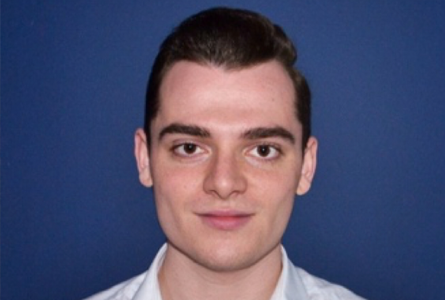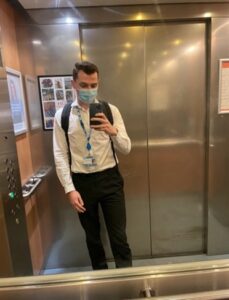Tom, General Management


What do you actually do on the grad scheme?
When I was researching graduate schemes to apply for, I was always keen to find out what my life as a graduate would look like. Looking back, I had no idea what I was about to sign myself up to on the GMTS. It is a very demanding, but also very rewarding scheme.
One of the main reasons I chose to apply to GMTS was for the varied placements you get while on the Scheme. I wasn’t from a professional background so I didn’t know what was out there for someone with a degree, so I was keen to try as many roles as possible to increase my chances of finding something I liked and could make a career out of.
Typically, on the General Management specialism you’ll do two longer NHS placements and a short trainee-organised flexi placement. Often, one of your NHS placements will be more operational and the other more strategic.
I did my operational placement at the Lister Hospital in Stevenage. I worked in the surgical division and had day-to-day management responsibility for a particular surgical specialty. I started out in Trauma and Orthopaedics and later moved to Plastic Surgery.

To try to help demystify what you do on an operational placement, or what NHS managers do in their day-to-day, I have split the role out into a few key areas and will go into a bit more detail for each:
- Responsible for smooth running of services
- Line management of admin teams
- Dealing with issues as they arise
Responsible for smooth day-to-day running of services:
- Checking outpatient clinics were booked when doctors were working, and cancelled or covered if they were on leave
- Checking operating theatre lists were fully booked when doctors were working, and cancelled or covered if they were on leave
- Reviewing operational performance against relevant national standards (eg. 2 week wait appointments for suspected cancer, cancer treatment within 62 days and reducing the routine waiting time that had increased to beyond 2 years as a result of COVID)
- Ensuring booking practices were fit for purpose, implementing improvements wherever possible

Line management of admin teams:
- Acted as line manager for 5 medical secretaries and an outpatient booking team
- Approval of annual leave requests
- Managing sickness and supporting staff back to work once fit
- Recruiting into vacancies including:
– Approval of vacancy
– Preparation of job description, person specification and job advert
– Shortlisting candidates for interview
– Interviewing
– Appointing successful candidate
– Arranging start dates and onboarding
– Appraisals and 1:1s
Dealing with issues as they arise:
- Doctor unexpectedly unavailable or delayed with patients waiting
– Locating/contacting doctor
– Dealing with impact on patient care – do any appointments need to be rescheduled?
– Investigating cause and attempting to prevent the same thing happening again - Patients presenting to the department thinking they had an appointment that we were unaware of
– Investigating communications sent to patient
– Determining if they can be seen
– Making arrangements for their future care if we were unable to accommodate
– Investigating cause of any mistake/issue to prevent it happening again - Projector not working for staff meeting
– Getting up on a chair and checking the cables at the back (got it working again!)

- Chairs gone missing from waiting room
– Literally searching the hospital for spare chairs and begging other departments for some of theirs - Not enough surgical equipment to perform skin cancer biopsy
– Contacting the Sterile Services Department to see if any kits that had been cleaned were available for use
– Contacting theatres department to determine if they had any appropriate spare equipment that could be used
– Escalating to matron who usually holds responsibility for ordering supplies - Case overrunning in theatres delaying the start of our afternoon list
– Determining if surgeon and operating team will be able to operate in a different operating room
– Finding out if team can support a late finish
– Agreeing most clinically appropriate patient to cancel if required, and escalating to higher management for approval to cancel if required
The above covers some examples of what I have come up against during my time in an operational role on GMTS, but the scheme take 250 trainees every year into 100+ different placement organisations. So, everybody has very different experiences and there is no typical day in the NHS!

About me
I grew up in Essex and was the first in my immediate family to go to university. I studied Natural Sciences at Cambridge but didn’t want to pursue a career in the sciences, so I was looking at various graduate schemes to apply to. I was heavily involved in the university response to COVID-19 as Students’ Union President for my college during the first two lockdowns. This was my first taste of operational management and lead me to apply to the GMTS.
Outside of work I’m a keen Formula 1 fan, have been known to take karaoke a bit too seriously and enjoy a night out with friends.